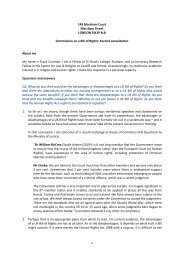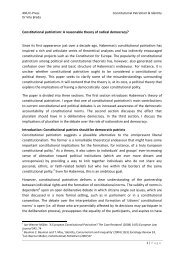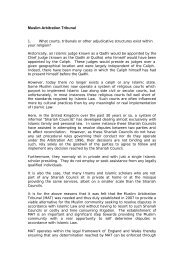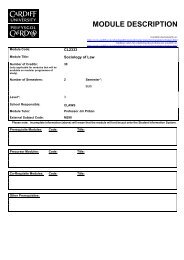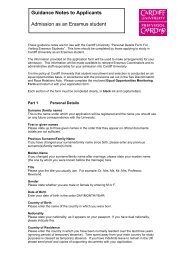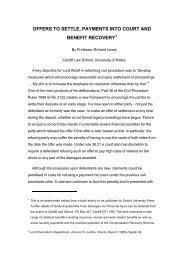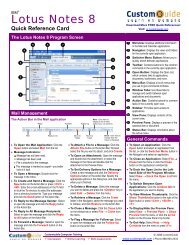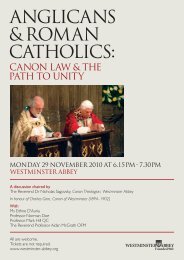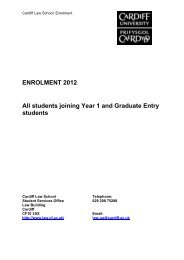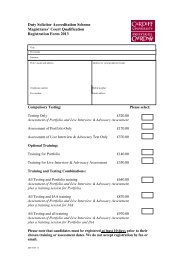MODULE DESCRIPTION - Cardiff Law School
MODULE DESCRIPTION - Cardiff Law School
MODULE DESCRIPTION - Cardiff Law School
Create successful ePaper yourself
Turn your PDF publications into a flip-book with our unique Google optimized e-Paper software.
Version 3<br />
Programmes of Study For Which<br />
This Module Is Compulsory:<br />
Programmes of Study For Which<br />
This Module Is Optional:<br />
Title of Programme: Years: Title of Programme: Years:<br />
LLB <strong>Law</strong> (single honours) (all routes)<br />
F<br />
LLB <strong>Law</strong> and Criminology (Integrated honours) F<br />
LLB <strong>Law</strong> and Politics (Integrated honours)<br />
F<br />
LLB <strong>Law</strong> and Sociology (Integrated honours) F<br />
LLB <strong>Law</strong> and French (Integrated honours)<br />
F<br />
LLB <strong>Law</strong> and German (Integrated honours)<br />
F<br />
LLB <strong>Law</strong> and Welsh (Integrated honours)<br />
F<br />
Certificate in Legal Studies (Exchange)<br />
F<br />
Exchange Programme<br />
F<br />
Module to be offered on a Free-Standing basis<br />
Please identify any additional restrictions to Free-Standing status:<br />
No<br />
* Circle the most appropriate<br />
AIMS OF THE <strong>MODULE</strong>:<br />
(Aims define the broad purpose of the module)<br />
1 to enable students to state and apply the rules of the English law of trusts dealt with in the course accurately and<br />
relevantly;<br />
2 to enable students to make critical assessments of that law and the scholarship pertaining thereto;<br />
3 to enable students to compare and contrast that law accurately and relevantly with the equivalent areas of any other<br />
legal system with which the student is familiar;<br />
4 to enable students to relate that law to the particular circumstances - political, social, cultural - in which it developed.<br />
LEARNING OUTCOMES OF THE <strong>MODULE</strong><br />
(Learning outcomes are statements of what a typical student is expected to know, understand and be able to do.)<br />
On completion of the module a student should be able to:<br />
1 Describe, explain, analyse and evaluate the principal characteristics and concepts of the English law of trusts,<br />
relating them to their political, social, economic, and cultural context. These will include:<br />
1.1 the distinction between common law and equity;<br />
1.2 the equitable remedies of specific performance and injunction, including the freezing injunction and the search<br />
order;<br />
1.3 express trusts;<br />
1.4 implied and resulting trusts;<br />
1.5 constructive trusts;<br />
1.6 completely constituted and incompletely constituted trusts;<br />
1.7 trusts of perfect and imperfect obligation;<br />
1.8 Quistclose trusts;<br />
1.9 discretionary and fixed-interest trusts;<br />
1.10 public (i.e. charitable) and private trusts;<br />
1.11 the powers and duties of trustees;<br />
1.12 personal remedies for breach of trust;<br />
1.13 proprietary remedies for breach of trust, including the rules of legal and equitable tracing.<br />
Knowledge and Understanding:<br />
1 At the conclusion of these modules, students will be able to:<br />
1.1 demonstrate a range of the subject-specific skills and perform all of the general transferable skills accurately<br />
and succinctly in lucid, reasoned prose written in English and/or Welsh.<br />
Intellectual Skills:<br />
PM005<br />
Page 2 of 4



